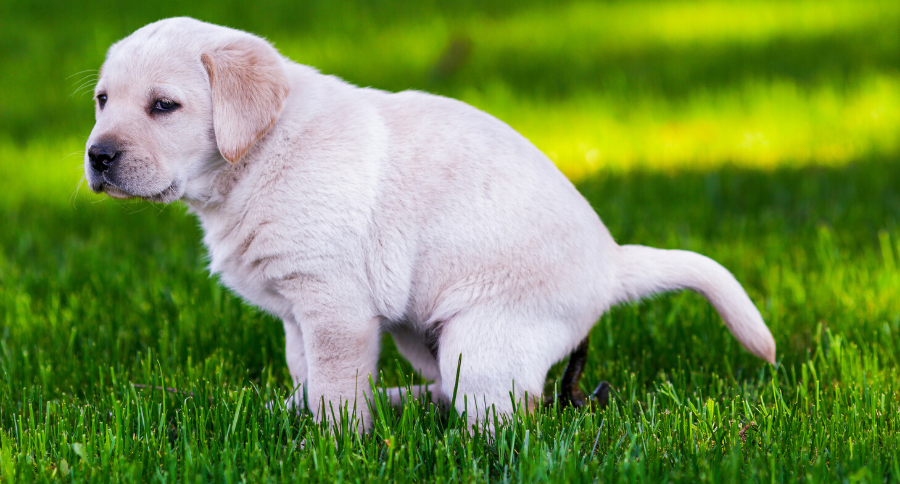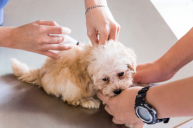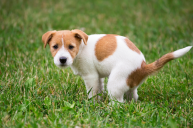Diarrhea in puppies can be an isolated incident or something more severe. Puppies spend the first months of their life in a bubble and for good reason. While you wait out their vaccinations and decide what they can and cannot eat, everything and every minute is so precious.
What are the common causes of diarrhea and when is it an emergency? Don't wait for more than one or two 'poor' potty sessions outside as young dogs and puppies can get dehydrated in about 24 hours. So when do you panic and when can you make some tweaks to their routine? When it comes to puppies and young dogs it's better to stay away from natural remedies. Talk to your vet if you're concerned.
Diet change or food allergies
https://www.instagram.com/p/B4yv9wHFRl5/
Consider the current food you're giving your puppy. Puppies may develop a sensitivity to certain foods or ingredients. If you suspect that your puppy has a food intolerance or sensitivity, talk to your vet about the best way to manage her diet and resolve her diarrhea. So this will require a vet visit and make sure you keep a food journal!
Bacterial infection
https://www.instagram.com/p/B4yu4-ojq5W/
American Kennel Club (AKC) shares that puppies have more delicate immune systems than adult dogs, which makes them more susceptible to bacterial infections.
"Salmonella, E. coli, Clostridium, and other bacteria can cause puppy diarrhea. These diseases are serious and are usually accompanied by other symptoms, like bloody diarrhea, loss of appetite, fever, and vomiting."
Viral infection
https://www.instagram.com/p/B4yuEORh3GF/
The American Kennel Club also tells us that the parvovirus and distemper virus are both potentially fatal diseases that affect unvaccinated or partially vaccinated puppies. All viruses require medical attention from your veterinarian.
Ingestion of garbage or foreign bodies
This could even be a bully stick. I made the mistake when our dog was a puppy to buy a subscription to a box that had all sorts of bones and chews. I monitored chewing and it was totally fine until his potty time before bed. Walter had terrible diarrhea.
Puppies also want to explore the entire world with their mouths. You must ensure nothing toxic or dangerous is within reach. This also requires a vet visit if it falls into the foreign body category.
Parasites
https://www.instagram.com/p/B4ytLw0Htwt/
One of my fave vet experts to refer to when I have puppy questions is Dr. Becker at Healthy Pets.
"Your puppy can be born with intestinal worms or acquire them from her mother's milk. Some of the most common organisms causing diarrhea in puppies are hookworms, roundworms, tapeworms and whipworms. Fortunately, worm infestations are easily cured medically, so get your puppy to her veterinarian if you suspect her diarrhea is caused by worms."
Don't delay treatment! Get to a vet!
Stress
https://www.instagram.com/p/B3761rkFci5/
Stress diarrhea should resolve in a few days. Dr. Becker tells us that you should make sure your puppy is hydrated and encourage them to drink!
The significant changes of moving to a new home can cause GI upset. Respect this and try to keep their routine consistent and stress-free.
A bland diet may be a good way to transition a stressed puppy from one diet to another and that typically consists of white rice and boiled chicken. This diet can also be used to help calm a puppy with a bout of diarrhea.
Given the wide range of causes of puppy diarrhea, you'll need to watch your pup like a hawk. Health problems can arise at any moment but keeping an eye on your dog's stool will help determine if loose stools in young puppies are an emergency or something caused by new food.
Always look for abdominal pain, a sudden change in behavior and always grab a stool sample in case you need to take that to the vet.
Do you live with a puppy? Please leave us a comment below!
WATCH NOW: Irish Wolfhounds Are the Tallest Dogs




